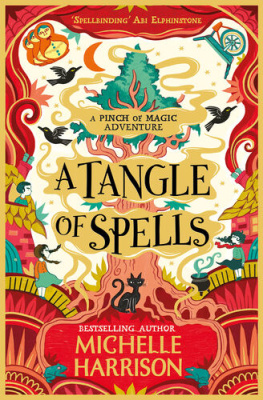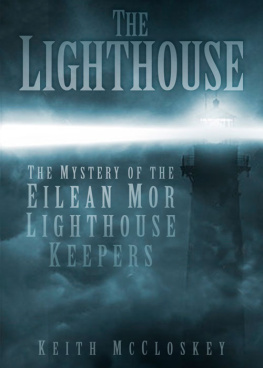Emma Stonex
THE LAMPLIGHTERS

We stood a moment still tongue-tied,
And each with black foreboding eyed
The door ere we should fling it wide
To leave the sunlight for the gloom
Wilfrid Wilson Gibson, Flannan Isle
Two different men; Ive been two men so long now.
From Tony Parker,
LighthouseIn December 1900, three lighthouse keepers disappeared from a remote rock light on the island of Eilean Mr in the Outer Hebrides. Their names were Thomas Marshall, James Ducat and Donald MacArthur. The Lamplighters is inspired by, and written in respectful memory of, this event, but is a work of fiction and therefore bears no resemblance to these mens lives or their characters.
I

1972
RELIEF
When Jory opens the curtains, the day is light and grey, the radio playing a half-known song. He listens to the news, about a girl whos gone missing from a bus stop up north, and drinks from a mug of brown tea. Poor Mothers beside herself well, she would be. Short hair, short skirt, big eyes, thats how he pictures the girl, shivering in the cold, and an empty bus stop where someone should have stood, waving or drowning, and the bus pulls up and away, never the wiser, and the pavement shines on in the black rain.
The sea is quiet, with the glass-like quality that comes after bad weather. Jory unlatches the window and the fresh air is very nearly solid, an edible thing, clinking between the trawler cottages like an ice cube in a drink. Theres nothing like the smell of the sea, nothing close: briny, clean, like vinegar kept in the fridge. Today its soundless. Jory knows loud seas and silent seas, heaving seas and mirror seas, seas where your boat feels like the last blink of humankind on a roll so determined and angry that you believe in what you dont believe in, such as the sea being that halfway thing between heaven and hell, or whatever lies up there and whatever lurks down deep. A fisherman told him once about the sea having two faces. You have to take the both, he said, the good and the bad, and never turn your back on either one of them.
Today, after a long time, the sea is on their side. Theyll do it today.

Hes in charge of whether the boat goes out there or not. Even if the winds good at nine it doesnt mean itll be good by ten, and whatever hes got in the harbour, say hes got four-feet-high waves in the harbour, he can guess theyll be forty feet round the tower. Whatever it is ashore, itll be ten times as much round the light.
The new delivery is twentyish, with yellow hair and thick glasses. They make his eyes look small, twitchy; he reminds Jory of something kept in a cage, living in sawdust. Hes standing there on the jetty in his cord bellbottoms, frayed ends darkened by the slopping sea. Early morning its quiet on the quay, a dog walker and a milk crate unloading. The frigid pause between Christmas and New Year.
Jory and his crew haul in the boys supplies Trident red cartons containing two months clothes and food, fresh meat, fruit, proper milk not powdered, a newspaper, box of tea, Golden Virginia and rope them down, covering the containers in tarpaulin. The keepers will be pleased: theyll have been on tinned stew the past four weeks and whatever was on the Mails front page the day the last relief went out.
In the shallows, the water burps seaweed, slurping and sucking round the sides of the boat. The boy climbs in, his plimsolls wet, groping the sides like a blind man. Under one arm he carries a parcel of belongings tied up with string books, cassette recorder, tapes, whatever hell use to pass the time. Hes a student, most likely: Trident gets a lot of students these days. Hell be writing music, thatll be his thing. Up in the lantern thinking this is the life. They all need an activity to do, especially on the towers cant spend your whole time running up and down the stairs. Jory knew a keeper way back when, a fine craftsman who put ships in bottles; hed spend his whole stay doing them and they were beautiful things by the end of it. And then they got televisions put in and this keeper threw it all away, literally chucked his whole kit out the window into the sea, and from then on sat watching the box every free moment he got.
Have you been doing this long? the boy asks. Jory says yeah, longer than youve been alive. Didnt think wed make it, he says. Ive been waiting since Tuesday. They put me in digs in the village and very nice it was too, but not so nice as Id want to stay there much longer. Every day I was looking out and thinking, will we ever get off? Talk about a bloody storm. Have to say I dont know how itll be out there when we get another. They told me youve never seen a storm till youve seen it from the sea, and it feels like the towers going to collapse right from underneath you and wash away.
The new ones always want to talk. Its nerves, Jory thinks, about the crossing and if the wind might change, about the landing, about the men on the light, whether hell fit in with them, what the one in charge is like. It isnt this boys light yet; probably it wont ever be. Supernumeraries come and go, land light this time, rock the next, shuttled round the country like a pinball. Jorys seen scores of them, keen to start and taken up in the romantic bit of it, but it isnt as romantic as that. Three men alone on a lighthouse in the middle of the sea. Theres nothing special about it, nothing at all, just three men and a lot of water. It takes a certain sort to withstand being locked up. Loneliness. Isolation. Monotony. Nothing for miles except sea and sea and sea. No friends. No women. Just the other two, day in, day out, unable to get away from them, it could drive you stark mad.
Its usual to wait days for the changeover, weeks even. Once he had a keeper stuck out there on a lost relief for four months straight.
Youll get used to the weather, he says to the boy.
I hope so.
And you wont be half as ticked off as the poor sod whos due ashore.
In a bevy at the stern his relief crew look despondently out to sea, smoking and grunting conversation, their damp fingers soaking their cigarettes. They could be painted into a dour seascape, brushed roughly with thick oils. Whatre we waiting for? one of them shouts. Dyou want the tide to turn before were off? Theyve got the engineer with them too, out to fix the radio. Normally, on relief day, theyd have been in touch with the light five times already, but the storm took out the transmission.
Jory covers the last of the boxes and starts the motor and then theyre away, the boat rocking and bobbing like a bath toy over the wavelets. A flock of gulls quarrel on a cockle-speckled rock; a blue trawler chugs idly into land. As the shoreline dwindles the water grows brisker, green waves leaping, crests that spume and dissolve. Further out the colours bleed darkly, the sea turning to khaki and the sky to ominous slate. Water butts and slops against the prow; strings of sea foam surge and disperse. Jory chews a roll-up thats been flattened in his pocket but is still just about smokable, eyes on the horizon, smoke in his mouth. His ears ache in the cold. Overhead a white bird wheels in a vast, drab sky.
He can decipher the Maiden in the haze, a lone spike, dignified, remote. Shes fifteen nautical miles out. Keepers prefer that, he knows: not to be so close to land that you can see it from the set-off and be reminded of home.
The boy sits with his back to her a funny way to start, Jory thinks, with your back to the thing youre going to. He worries at a scratch on his thumb. His face looks soft and ill, uninitiated. But every seaman has to find his legs.













